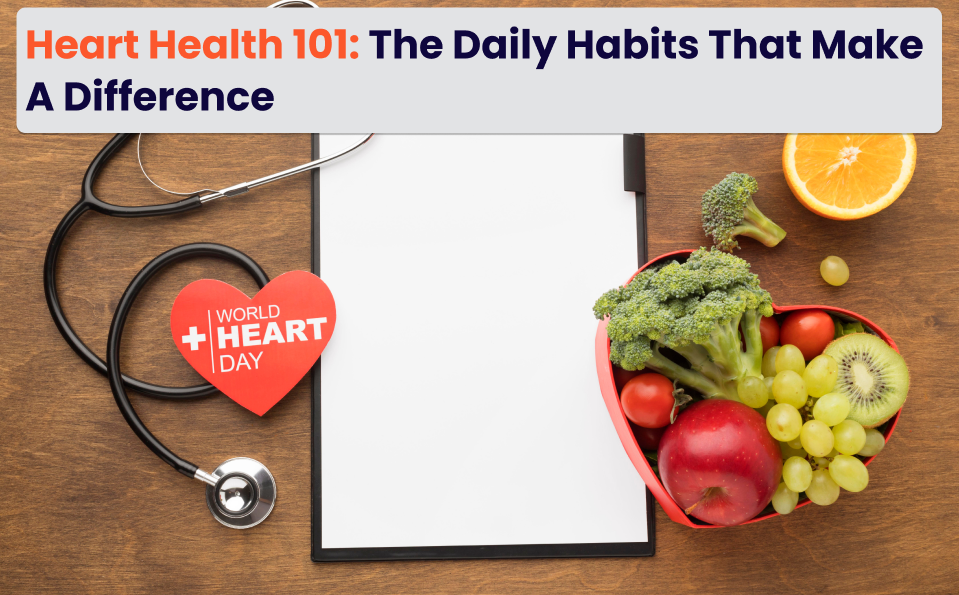
Heart Health 101: The Daily Habits That Make a Difference
MMaintaining a healthy heart is crucial for overall well-being, especially in the USA and Canada, where heart disease remains one of the leading causes of death. Fortunately, by incorporating a few simple daily habits into your routine, you can significantly reduce your risk of heart-related issues. Whether you’re in your 20s or your 60s, these heart health basics are key to leading a healthier, longer life.
1. Eat a Heart-Healthy Diet
A nutritious diet is one of the most powerful tools for promoting heart health. Eating the right foods can help manage weight, lower cholesterol levels, and reduce blood pressure, all of which are crucial for keeping your heart strong.
What to Include:
- Fruits and vegetables: Rich in vitamins, minerals, and antioxidants that protect your heart. Aim to fill half of your plate with colorful fruits and veggies like leafy greens, berries, carrots, and tomatoes.
- Whole grains: Foods like whole-wheat bread, oats, brown rice, and quinoa provide fiber, which can lower bad cholesterol (LDL) levels and improve overall heart function.
Healthy fats: Opt for unsaturated fats found in olive oil, avocados, nuts, and fatty fish like salmon and mackerel. These fats help reduce inflammation and support healthy cholesterol levels. - Lean protein: Incorporate lean meats like chicken, turkey, and plant-based proteins like beans, lentils, and tofu.
- Lean protein: Incorporate lean meats like chicken, turkey, and plant-based proteins like beans, lentils, and tofu.
What to Limit:
- Saturated and trans fats: These can raise your LDL cholesterol levels, increasing your risk of heart disease. Avoid processed foods, fast foods, and items high in butter or lard.
- Excess sodium: Too much salt can raise blood pressure. Aim to consume less than 2,300 milligrams of sodium per day, and even lower if possible.
- Added sugars: High sugar intake can contribute to obesity, diabetes, and heart disease. Watch out for sugary drinks, candy, and baked goods.
2. Stay Active

Physical activity is another cornerstone of heart health. Regular exercise strengthens your heart, improves circulation, and helps maintain a healthy weight. The American Heart Association recommends at least 150 minutes of moderate-intensity aerobic activity or 75 minutes of vigorous activity per week.
Daily Exercise Tips:
- Practice mindfulness or meditation: Taking even a few minutes a day to breathe deeply and focus on the present moment can significantly lower stress levels.
- Get outdoors: Spending time in nature, whether it’s a short walk or a weekend hike, can do wonders for your mental health and heart.
- Connect with loved ones: Having a strong support system can help you navigate life’s challenges and reduce stress. Make time to socialize with friends and family regularly.
- Prioritize self-care:Engage in hobbies you enjoy, whether it’s reading, gardening, or cooking. Giving yourself time to unwind is crucial for mental well-being.
If you have a sedentary job, take breaks to stand, stretch, or move around throughout the day. Every little bit of movement adds up!
3. Manage Stress

Stress is a silent contributor to heart disease. Chronic stress can lead to high blood pressure, increased cholesterol, and unhealthy coping mechanisms like overeating or smoking.
Ways to Reduce Stress:
- Practice mindfulness or meditation: Taking even a few minutes a day to breathe deeply and focus on the present moment can significantly lower stress levels.
- Get outdoors: Spending time in nature, whether it’s a short walk or a weekend hike, can do wonders for your mental health and heart.
- Connect with loved ones: Having a strong support system can help you navigate life’s challenges and reduce stress. Make time to socialize with friends and family regularly.
- Prioritize self-care: Engage in hobbies you enjoy, whether it’s reading, gardening, or cooking. Giving yourself time to unwind is crucial for mental well-being.
4. Get Quality Sleep

Your heart works hard all day, and it needs rest too. Poor sleep has been linked to heart disease, high blood pressure, and stroke. Adults should aim for 7-9 hours of quality sleep each night.
Tips for better sleep:
- Tips for Better Sleep: Stick to a routine: Try to go to bed and wake up at the same time every day, even on weekends.
- Create a restful environment: Keep your bedroom cool, dark, and quiet. Invest in a comfortable mattress and pillows.
- Limit screen time: Avoid using electronic devices at least an hour before bedtime, as the blue light emitted from screens can interfere with your sleep cycle.
5. Avoid Smoking and Limit Alcohol/h3>

- Smoking Smoking damages blood vessels, raises blood pressure, and significantly increases the risk of heart disease. If you smoke, quitting is the single best thing you can do for your heart.
- Alcohol in moderation: Moderate alcohol consumption (one drink per day for women and two for men) may offer some heart health benefits, but excessive drinking can lead to high blood pressure and heart failure. Stick to the recommended limits or avoid alcohol altogether.
6. Monitor Your Heart Health

Being proactive about your heart health means keeping track of your numbers. Regular check-ups can help you monitor vital signs like blood pressure, cholesterol levels, and blood sugar.
Key Numbers to Watch:
- Blood pressure: A healthy reading is typically less than 120/80 mmHg. High blood pressure increases the risk of heart attack and stroke
- Cholesterol levels: Aim for an LDL (bad cholesterol) level below 100 mg/dL and an HDL (good cholesterol) level of 60 mg/dL or higher.
- Blood sugar: High blood sugar can lead to diabetes, which increases the risk of heart disease. A fasting blood sugar level below 100 mg/dL is ideal.
If any of your numbers are out of the normal range, work with your healthcare provider to develop a plan to manage them.
FAQs
Q: What are the first signs of heart problems?
A: Common early signs include chest pain, shortness of breath, fatigue, and irregular heartbeats. Always consult a doctor if you experience any of these symptoms.
Q: How much exercise is enough for heart health?
A: Aim for at least 150 minutes of moderate aerobic activity or 75 minutes of vigorous activity per week.
Q: Can heart disease be reversed with lifestyle changes?
A: While some damage may be irreversible, adopting a healthy lifestyle can significantly reduce risk factors and improve overall heart function.
Summary
Taking care of your heart doesn’t have to be overwhelming. By focusing on these simple, daily habits—eating well, staying active, managing stress, getting enough sleep, avoiding harmful substances, and monitoring your health—you can drastically improve your heart health and reduce the risk of heart disease. Remember, small changes lead to big results, so start incorporating these heart-healthy tips into your routine today for a stronger, healthier heart.
Incorporate these actionable tips into your routine and share this blog with friends and family to spread awareness about heart health! By doing so, you can contribute to healthier communities in the USA and Canada while promoting overall well-being.





